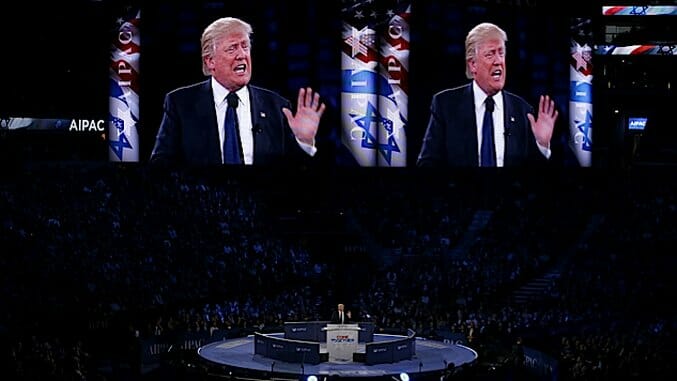
Jean-Pierre Faye, a French philosopher, is well known for his “horseshoe theory” of political ideology. His theory puts language to what many have experienced throughout history: The radical-left and the radical-right are much closer to each other than they are to the political center. And, if you move far enough in either direction on the spectrum, you reach totalitarianism.
Faye’s work, it seems, is the appropriate backdrop for the 2016 presidential election. In addition to the horseshoe theory, Faye spent a great deal of time writing about the cultural appropriation of language under totalitarianism.
This is particularly relevant because totalitarianism, as an organizing principle, is overtly on the table for the first time in modern American history with the GOP’s nomination of Donald Trump. That’s not say that the legislature or the courts would fail in such way as to usher in a truly totalitarian regime, but it is to say that a Trump administration would represent a shift beyond the “imperial presidency” we’ve grown accustomed to since Arthur Schlesinger, Jr. coined the phrase in the 1970s.
It was President Nixon’s criminal overreach of civil liberties—and criminality in general—that lead Schlesinger to examine the decline of what he termed the “constitutional presidency”—a presidency bound to the other branches of the federal government in a prohibitive way. This shift in explicit and implicit power away from the Congress and courts and toward the executive has emboldened presidents to act unilaterally on both foreign and domestic policy.
If Nixon inaugurated the era of the imperial presidency (Schlesinger would contend it started much earlier), Trump represents a new era entirely. He’s openly talked about inciting violence amongst his supporters should he lose the nomination. And his signature policy proposals are the deportation of some 11 million Mexican immigrants, the impossible construction of a southern border wall, and the banning of new Muslim migrants. Not to mention the registering—and, one could safely assume, harassment—of existing Muslims in America.
This is to say basically nothing of his misogyny or his embrace of Vladimir Putin or his desire to negotiate with directly with Kim Jong-un. While these draconian ideas have propelled him to the GOP nomination, they’ve also earned him the label of heir to Mussolini.
These policy ideas matter as much as Trump’s own persona. They speak to the layered cultural myths that have become part and parcel of a particular worldview. It’s why Trump isn’t just anti-immigration; he’s anti-immigrant. In his world, Mexicans aren’t simply replacing American workers, they’re also rapists and murderers. Muslims don’t just redouble the need for multiculturalism, they’re also terrorists. This shift from talking about people groups in theory to assigning scary characteristics to your neighbors lays the emotional foundation for backlash—and for the rise of totalitarianism as an appealing response.
The same case can be made for Trump’s awkward attempts to embrace a symbolic Christianity. He said in a CNN interview, “I have great relationship with God. I have great relationship with the Evangelicals…I like to be good. I don’t like to have to ask for forgiveness. And I am good. I don’t do a lot of things that are bad. I try to do nothing that is bad.” This reads eerily close to Orwell’s Newspeak.
Not only does Trump offhandedly reject a foundational principle of Christianity—the need for forgiveness—he conflates a relationship with God to simply knowing evangelicals, to the exclusion of mainline Christians, Anabaptists, Catholics, Orthodox, and others. If Trump’s feigned sincerity isn’t obvious enough, he has no stated working knowledge of biblical passages, books of the bible, or any of the core theological teachings paramount to the actual practice of Christian beliefs.
None of which is to demand that Trump posses these attributes to be a qualified candidate for president—that’s no longer true in a cultural landscape where the fastest-growing religious group is “not affiliated.” Quite the opposite. It betrays the fact that his driving conviction is the pursuit of power. For which he’ll say and/or do basically anything, including gesturing Christian belief (to a very mixed response among evangelicals, it must be noted).
It’s perhaps this ability to use language to incite large crowds while lacking a basic coherency that’s most alarming. It’s the totem of historic totalitarianism. Hitler’s Germany, Franco’s Spain, and Mussolini’s Italy all bore a linguistic resemblance to one another: A return to racial or ethnic simplicity, systemic economic grievance fixable by one man, and an outward enemy of the state that requires violent vigilance. Trump connects in all of the areas, and does so with a parlance that resonates and baffles in equal measure.
Trump’s unpopularity nationally, and especially with Democrats, makes any real threat to America’s governing institutions still seem remote. Most experts think with Trump at the top of the ticket, Republicans stand to lose ground in the House and in the Senate, perhaps even losing their majorities.
However, his threat to our politics is very real. By echoing White Supremacists, quoting Mussolini, and through his verbal abuse of women (and the bizarre fascination with dating his daughter in an alternate reality), he’s energized the ugliest elements of our society and, with time, will begin to wash them of their social stigma. This is much like what Jean-Marie and Marine Le Pen have done in France through the National Front, or what the Austrian Freedom Party accomplished in recent voting.
Republican voters can choose to be complicit in this toxic brew, or they can choose to stop it by voting for anyone but Trump. But to be clear, the burden is now on conservative voters to disprove the idea that Trump’s rise is representative of their body politic, and that it instead represents a hostile takeover. One side represents a derelict party apparatus, but the other represents a brave new world.